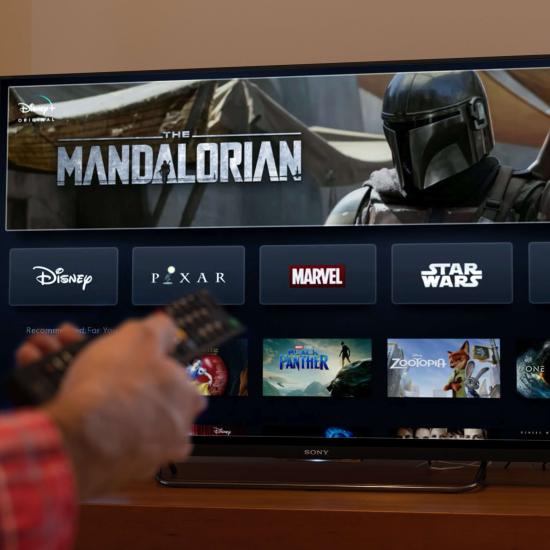In the second of our media series, we look at the impact of streaming on content creation, distribution and the zeitgeist itself – and how platforms like Netflix and Disney+ can keep growing.
Creatively, what made the The Mandalorian such a leap – it became the US-top-rated streamed title of Christmas 2020 - was Stagecraft, a new technology. Like the Unreal Engine which drives modern computer games, it renders three-dimensional photo-real backdrops to move perspective with the camera position. The reward? An astounding ten-series Star Wars order.
Streaming is peak customer centricity: a perfect TV restaurant, in which the waiter has guessed each diner’s order without even showing them the menu. Binge engagement feeds lower churn and marketing costs, higher gross profits, more content investment and happy shareholders.
Culturally, streaming also matters. To the chagrin of national broadcasters, it is the lingua franca of the 2020s – the watercooler, and globally.
Netflix’ Bridgerton was set in an if-only, non-racist late 18th century England by Hollywood’s Shonda Rhimes. With its high profile (though it was the fourth biggest December title in the US), it is already a cultural benchmark for early 2021. Cinemas are closed and more titles are being delayed – Sony’s Cinderella with Camila Cabello, and Jared Leto superhero thriller Morbius.
Broadcast networks are struggling for younger eyeballs (average age of a CBS viewer: 63). In that context, Rhimes created elegant global diversion, auguring further waves of streamed content. Let’s look at some business options for the streamers in general.

Apple will look at streamers, but buy studios
Months after the title premiered, Apple TV+ is still listing the Tom Hanks’ submarine war movie Greyhound as ‘trending.’ Like the film, content on the platform is good (The Morning Show, Tehran) - but thin as ice.
To win in streaming, Apple must match the nascent duopoly of Netflix (with a new title every two days) and Disney+ (with astonishing subscriber growth to 86.8m in year one.) Apple TV+ needs to bulk up content faster than it could ever produce it, even without Covid closing sets worldwide. Buying secondary rights doesn’t work, because the best talent and titles are already pre-owned (think HBO’s Game of Thrones or The Undoing.) So the simple option is acquisition.
Culturally, streaming ... is the lingua franca of the 2020s.
Streaming candidates have the scale and library, but corporate challenges. Would AT&T sell HBO, emasculating its own turnaround plan after shaky acquisitions? Would Comcast sell NBC’s Peacock, would that make any sense without also buying NBC, and does Apple want a dinosaur TV channel ? (Surely not.) Does Discovery – newly evangelised to streaming with its own Discovery+ offer - have enough relatable content, beyond bearded men building stuff in the woods?
Amazon wouldn’t sell Prime Video, a footnote on its income statement. Which leaves Netflix, with its $238bn enterprise value, a little over a tenth of Apple’s size, but nowhere near the profits. It would be noticeably dilutive, but attractive as a multiple-enhancing, recurring revenue bundle.
Or Apple can buy a studio. James Bond home MGM is reportedly on the market for around $5.5bn - less than the daily variance in Apple’s own $2tn market capitalisation. Buy it now and you get the Covid-delayed Bond movie No Time To Die as well. That is a huge draw for streaming as a first release, as Wonder Woman 1984 proved for Warner Brothers over Christmas 2020.
Apple could go for the whole of WarnerMedia. Or it could buy indie producers for pipeline access in the way that Netflix gets from in-house production: super-producers like the global TV production companies Banijay or All3Media, or fashionable ones like the UK/US Sister Pictures, which made Chernobyl. My money is on Apple buying producers.
The super-producer boom will go global
Data and AI-driven recommendation power Netflix and Spotify – but that’s not everything you need in media. The instinct of a great producer will have more value than ever, especially when combined with statistical insights.
As Bela Bajaria, head of Netflix global TV observed: “‘There was never any data that would have proven that a series about a female chess prodigy would have captured hearts and minds in the way Queen’s Gambit eventually did.”
The instinct of a great producer will have more value than ever.
Is there a contradiction in that ? Not really. Artificial intelligence company Deepmind, part of Google, found that Human plus its AI computer AlphaZero beat AI alone at Chess. It is the same in media.
So expect more avid competition than ever in 2021 for the services of the elite producers who can deliver hit drama and reality series – and not just in the English language.
There were some big production deals in Hollywood in the past two years, and many who thought the streamers had gone too far in their pursuit of marquee talent. Netflix hired not only Shonda Rhimes (How To Get Away with Murder, and her no doubt zeitgeisty upcoming show SoHo Grifter about the fake Russian heiress Anna Sorkin who duped New York), David Benioff and DB Weiss (Game of Thrones) and Ryan Murphy (American Crime Story, Hollywood). WarnerMedia hired JJ Abrams and his Bad Robot production company (producer of Star Trek, Mission: Impossible, Cloverfield) to make TV, potentially for over $250m.
But the equally big change was that the buying went global - potentially good news culturally for a distressed planet. Spanish-language Money Heist (La Casa de Papel) producer Alex Pina did a global Netflix deal, aiming to follow up with female action drama Sky Rojo.
Netflix has added local production in Amsterdam, Paris, Madrid, Berlin, Tokyo, Seoul, Sydney and SIngapore. It’s also pushing on African content – which finally the global media is starting to embrace.
Expansion to cinemas, and even gaming
As a consequence of the pent-up demand for new titles a production boom will rush into the vacuum as soon as Covid cools. London film studio space should completely max out in Summer 2021 as production requirements meet the slim pickings left behind buyouts of Disney at Pinewood and Netflix at Shepperton.
Even the patently non-modern experience of a trip to the movies may be about to get a streamer’s makeover.
Streamers will grow the cinema category - even though they don’t own cinemas.
Initially, the streamer entries to BAFTAs and Oscars were few –Roma, or Beast of No Nation. This year, they are almost the majority. Amazon’s alone included documentaries (All In: the Fight for Democracy), political comedy (Borat Subsequent Moviefilm) docudramas (One Night in Miami) and movies (I’m Your Woman).
Now expect that Amazon or Netflix will test new launch strategies for award films, and other entertainment delivery approaches, by buying a small cinema chain, probably in the US (Amazon is often linked to AMC.) Even the patently non-modern experience of a trip to the movies may be about to get a streamer’s makeover.
And after that? Netflix could shake things up a bit, by deploying its peerless recommendation engine and user experience, to launch a video games streaming platform.
Note: Of companies mentioned in this article, Alex Connock is a shareholder in Amazon and Netflix. He is Fellow in Management Practice (Marketing) at the Saïd Business School.
This article is part of a three-part series looking at media in the 2020’s:




